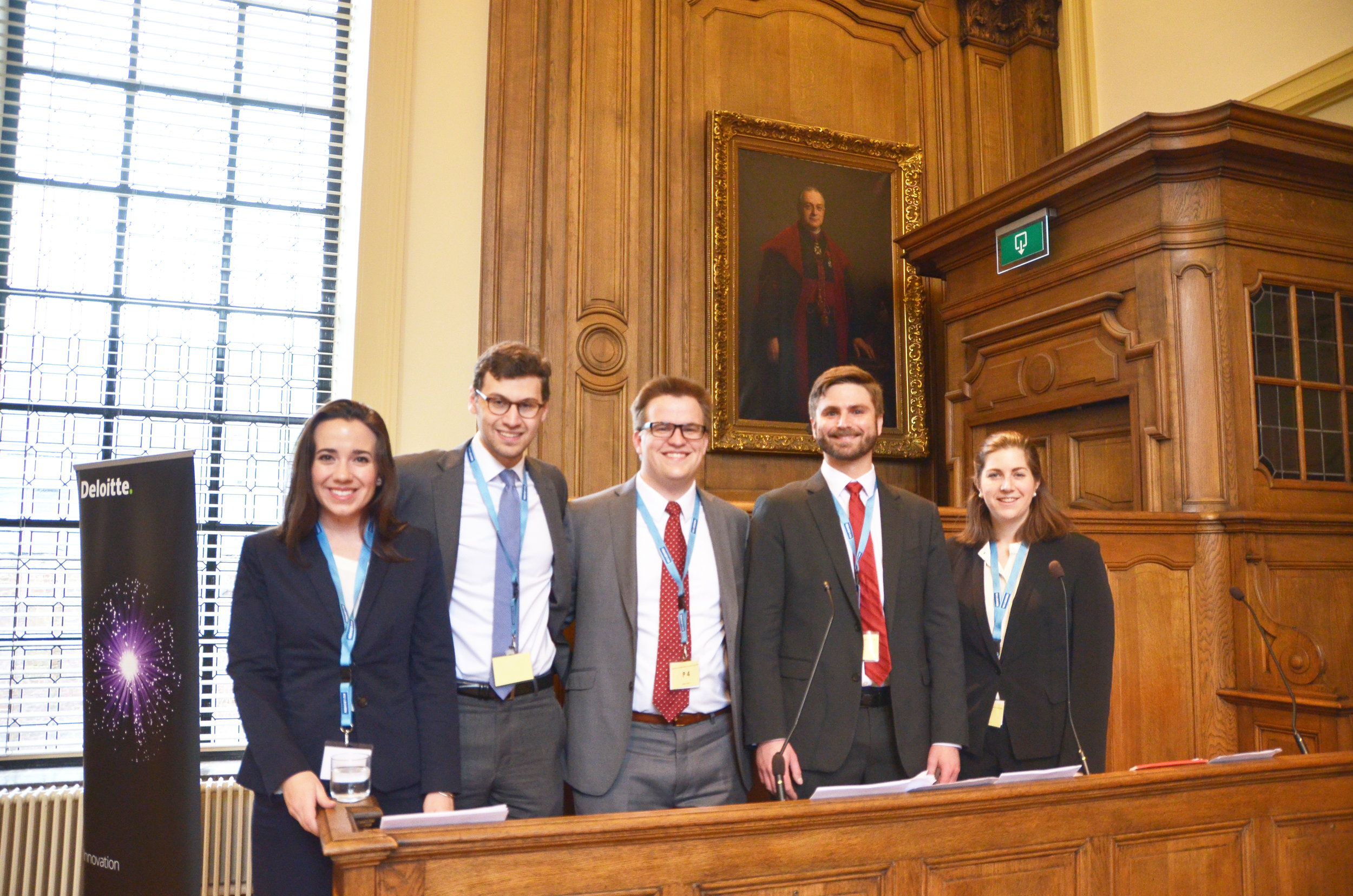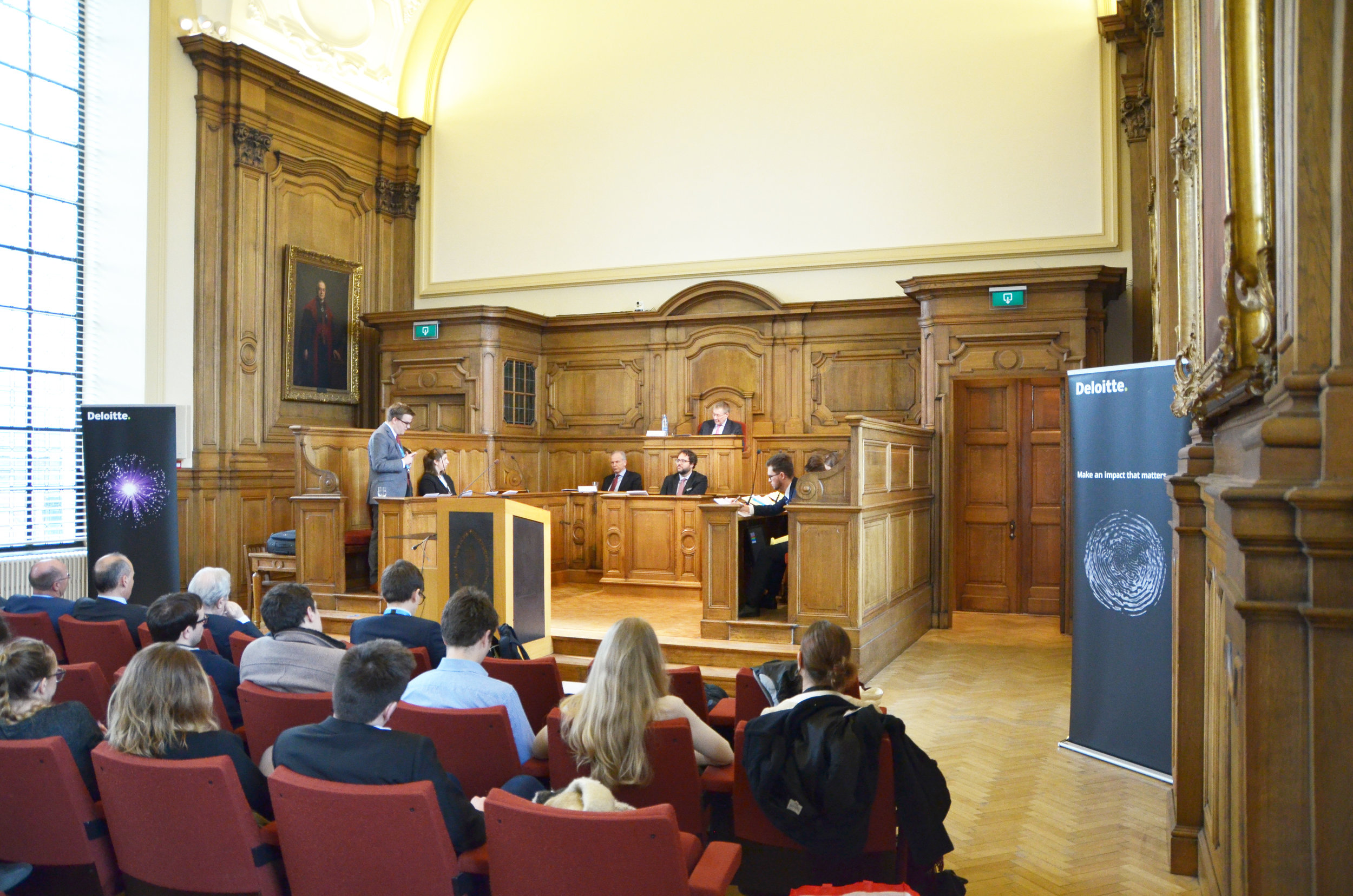GOATS: Greatest of All Tax Students
Jenna Goldman '18
Editor-in-Chief-in-Exile
Julia Wynn, Brandon Dubov, Phil Ogea, David Rubin, and Christina McLeod in court in Leuven. Photo courtesy Philip Ogea.
It was a season of firsts for the international tax community.
The University of Virginia Law International and European Tax Moot Court competition team clinched first place last Friday in Leuven, Belgium—the first American win in the competition’s history. The team comprised Christina McLeod ‘18, Julia Wynn ’18, Phil Ogea ’18, David Rubin ’19, and their coach Brandon Dubov ’18.
The win coincided with Professor Ruth Mason’s appointment as professor in residence for the International Bureau of Fiscal Documentation based in Amsterdam. Professor Mason is the youngest professor and first woman to hold the distinction. Her scholarship focuses on European Union taxation issues and tax discrimination, two areas that proved vital to the team’s win. Professor Mason served as mentor to the team, and the four members met with her weekly to discuss international tax issues, and receive research guidance and feedback on their arguments. All participants were required to take Professor Mason’s Topics in International Tax class to be on the team. “She taught us everything we knew before the competition,” said Ogea.
The team began preparations for the competition immediately after the problem was released in October of 2017.
Phil Ogea rises to argue a point. Photo courtesy Phil Ogea.
Based on the Organization for Economic Cooperation and Development (OECD) Model Treaty (the international model standard for tax treaties between countries), the music-themed problem this year took place in the state of Jazzterra. When the taxpayer, a limited liability company called Musicalia, incorporated a subsidiary—Milestone—in the state, all cacophony broke loose.
The issues surrounded the corporation’s residence, the beneficial ownership of the corporation’s dividends, what constitutes a permanent establishment under the treaty, and subsequently where the business profits can be taxed. The ultimate question was whether the taxpayer, Musicalia, has a taxable presence in Jazzterra.
The team worked tirelessly researching the OECD Model Treaty and its commentary, read scholarship and international case law surrounding the complex issues imbedded in the problem. The biggest obstacle they encountered during their research was that not all the sources and cases were in English, so they relied on Google Translate (which didn’t translate the specialized tax language) to parse through the sources in Dutch and French. Luckily one team member, Julia Wynn, spoke French and was able to help with translation.
Then began the arduous task of writing two briefs and preparing for oral arguments. Wynn and Rubin represented a foreign taxpayer hoping the treaty would protect them from tax, and McLeod and Ogea represented the taxing state, and discussed why the treaty did not protect the taxpayer. All four worked on both sides of the brief, but each argued their respective sides during the first two rounds of oral arguments in Leuven.
The weeklong competition began on Monday, when McLeod and Ogea for the tax authority argued against O.P. Jindal Global University of India. The next day Wynn and Rubin argued for the taxpayer against University of Luxembourg. They found out that night that their team made the semifinals and would reargue their cases the next day. The sub-team for the tax authority bested University of Heidelberg and the sub-team for the taxpayer trounced the hosting school, KU Leuven.
When the four found out they made the final four, they briefly celebrated with a Belgian Ale then immediately returned to the library. “It was totally unexpected when we made the top two,” said McLeod. When they received word that the team would go head to head with the dominant Ukrainian team, from the National University of Kyiv-Mohyla Academy of Ukraine, the team hoped for the best. “We had twenty-four hours to research a new problem, write an entire new brief, then argue before the panel of some of the most prominent tax lawyers in the world," McLeod said.
After turning in the brief, the team had 12 hours to sleep and prepare for oral arguments. UVa represented the Tax Authority of Jazzterra in the final, which was argued by Rubin and Ogea.
Some more scenes of two-fisted tax law. Photo courtesy Philip Ogea.
“We were underdogs with a red-white-and-blue target on our backs,” said Rubin, the team’s sole 2L. “Thanks to teamwork, ingenuity, and strong Belgian coffee, we came through when it mattered most. It was like a movie that, admittedly, no one would ever watch.”
In true Cinderella fashion, the UVa team pulled through with a slam-dunk brief and argument that impressed the panel of prominent international judges. “We raised some unique arguments, which the judges liked,” explained McLeod.
Their coach never doubted the team’s promise of success. “Nothing less than first place was acceptable,“ Dubov explained. “Here are the rules: No sugar. During the competition, your diet should focus on almonds and fish, but no white fish.”
A highlight of the competition for Ogea was listening to international tax professors speak about the importance of Professor Mason’s scholarship. “It was cool seeing other professors complimenting the people who teach us everyday. To understand how Professor Mason plays a larger role in international tax scholarship really put our class into perspective.”
Congratulations to Professor Mason and the entire Tax Moot Court team! At least there was one UVa team that outperformed its seed this March to become international champions.
----
jmg3db@virginia.edu
she/her/hers



